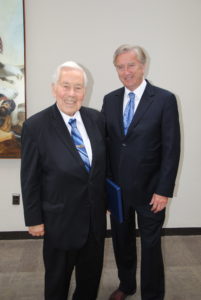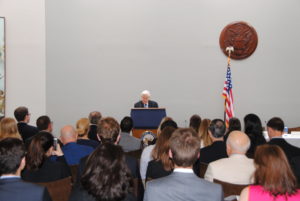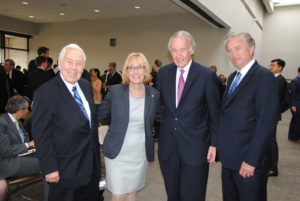Senator Richard (Dick) Lugar, a Republican Senator from Indiana from 1977-2013, passed away Sunday, April 28, leaving behind a legacy of leadership on nuclear arms control. That legacy includes the seminal Nunn-Lugar Cooperative Threat Reduction program, which helped secure and dismantle weapons of mass destruction in former Soviet states after the end of the Cold War.
Sen. Lugar’s work on these issues didn’t end when he left office. In 2013, he founded The Lugar Center, a nonprofit organization dedicated to the non-proliferation of weapons of mass destruction; global food security; foreign assistance effectiveness and global development; energy security; and enhancing bipartisan governance. He continued to weigh in on key foreign policy issues, including his support of the Iran nuclear deal.
The Center was honored to call him a friend for many years. As Executive Director John Tierney said, “Dick Lugar was a credit to his state and country. We’d be much better off if more people today had his understanding and appreciation for the dangers of nuclear weapons — and the will to do something about it.”
As we honor the life of a man who made the world a safer place, we would like to share some of our favorite recent memories of him.
June, 2018: Sen. Lugar speaks at a Center event commemorating the 50-year anniversary of the nuclear Non-Proliferation Treaty
At the event, Sen. Lugar called the NPT “a triumph of strategic foresight” and a “model for how to avoid crisis in the first place.”



September, 2017: Sen. Lugar and Sen. Sam Nunn discuss the Nunn-Lugar Cooperative Threat Reduction program
When the Cold War ended, four separate countries suddenly inherited the former Soviet nuclear arsenal. Destroying and removing those weapons was a herculean effort, and it couldn’t have been done without the bipartisan leadership of two U.S. Senators. We tell the story with Senators Nunn and Lugar, as well as former Assistant Secretary of Defense Andrew Weber.
August, 2016: Ask an Expert: Senator Lugar on Cooperative Threat Reduction
Nukes of Hazard: What motivated you to propose the Cooperative Threat Reduction Program?
Senator Lugar: Essentially my interest in Cooperative Threat Reduction began with the Geneva Switzerland Negotiations in 1986. On that occasion, President Reagan thought that it was possible to begin negotiating an arms control agreement with the Soviet Union. He suggested that the Senate send over a bipartisan delegation. I was one of the senators that was invited to go, as was Senator Sam Nunn (Sam) of Georgia. We visited the Russian consulate when we were in Geneva, and we had a series of meetings with Russians over the next five years. As we got to know each other better and there was more trust involved, we learned of internal difficulties within the USSR. Read the full interview
December, 2012: President Obama honors Nunn and Lugar at the National Defense University
President Obama spoke at the National Defense University as part of a day-long symposium to commemorate the 20th anniversary of the Nunn-Lugar Cooperative Threat Reduction (CTR) program and honor the two men most responsible for its extraordinary achievements: Nunn and Lugar. Read more
February, 2011: Quote of the Day: Lugar Edition
On his support for the New START treaty:
“I’ve been working systematically for 20 years going to Russia trying to help direct a situation in which we’re taking warheads off of missiles every day, destroying missiles that were aimed at us; destroying submarines that carried missiles up and down our coast. I’ve got to say ‘Get real.’ I hear Tea Party or other people talking about they were against START. I said ‘Well, now, hang on here.’
If you want to get into START, let’s talk about it, but realistically as Americans, not as some Republican renegade. [I’m] trying to take warheads of Russia [out of circulation] so they won’t hit Indiana.”
